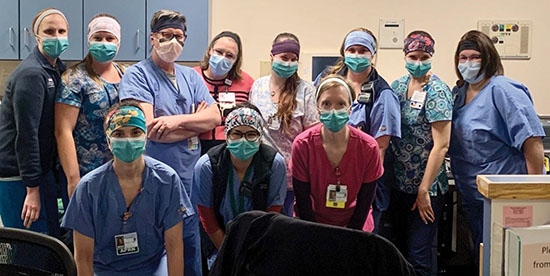Clinical program
The Intensive Care Nursery at the Children’s Hospital at Dartmouth Hitchcock Medical Center is a 30-bed level III unit located in Lebanon, NH. Children’s Hospital at Dartmouth Hitchcock Medical Center is a full service children’s hospital offering nearly all pediatric subspecialties, excluding cardiac surgery. The ICN has approximately 450 annual admissions of both inborn and outborn infants.
Fellows will complete 12 clinical 4-week blocks spread over 3 years. Each fellow will work with the program leadership to plan a clinical schedule that optimizes individual learning.
During clinical time, fellows will work with attending faculty to manage the unit, assess admissions, and consult with subspecialists. Fellows will complete antenatal consultations on the Birthing Pavilion and attend high-risk deliveries. Fellows will gain experience in high-risk obstetrics, diagnosis and management of congenital heart disease, ultrasound, clinical pathology, and genetics. Fellows learn effective ICN administration, interactions with community and referring physicians, and physician-nurse-ancillary caregiver relationships. Each fellow will gradually gain autonomy in leading the team and managing a busy unit.
Over the course of their training, fellows will obtain experience in high-risk follow up through the Neonatal Follow-up Clinic. This clinic, headed by Neonatologist Dr. Hartman, is a multi-disciplinary team that provides long-term medical and developmental follow-up.
Each fellow will complete one block of Maternal-Fetal Medicine, where they work closely with the MFM obstetricians to manage and follow high-risk mothers. One block of elective is also required, which the fellow individualize to fit their needs. Through connections at Boston Children’s Hospital, fellows can complete an elective in the BCH Cardiac ICU.
Our fellows also participate in the many teaching activities of Neonatal-Perinatal Medicine. They are group discussion leaders for medical students, give didactic lectures to pediatric house staff, and supervise care in the ICN.
Overnight Call for fellows is done in house in the ICN. On call nights, fellows manage the unit, respond to clinical issues, and attend deliveries. The call schedule is made by the fellows themselves, and will typically be one weeknight per week and one weekend per month.
Research program
Scholarly activity is an integral part of the Neonatal-Perinatal Fellowship. Our goal is to prepare fellows to be successful in academic neonatology. Fellows in our program have opportunities to perform research in a variety of disciplines. They can perform basic science research, clinical research (including clinical trials and epidemiologic studies), quality improvement research, and research on patient safety. Fellows will be mentored by experienced investigators in their research projects. In basic science, fellows work in an established laboratory together with pre- and post-doctoral students. For clinical research, quality improvement and patient safety projects, they will work with neonatology faculty as well with faculty from The Dartmouth Institute.
The ICN is an active member of the Vermont Oxford Network (VON) and has strong ties to the leadership of the Network. Fellows are able to use this resource to plan and create quality improvement projects. Fellows are encouraged to submit their work to the Annual Quality Congress. Many previous fellows have been awarded the AAP/VON scholar award.
Each fellow will have a scholarly oversight committee, determined based on their field of inquiry and program leadership. This committee meets with fellows through their training to mentor, guide, and follow the scholarly activity progress. Fellows are expected to have a manuscript for submission at the completion of their training.
Previous scholarly work
- Improving the Discharge Home Process from the Dartmouth-Hitchcock Intensive Care Nursery: A Quality Improvement Project
- Using Involuntary Fine Eye Movements as a Novel Way to Measure Sleep in Neonates
- S.A.D. in the NICU: Screening Around Depression
- Improving the Quality of Care and Oxygen Utilization in Premature Infants
- An Unsung Casualty of Prematurity: Evidence of Renal Injury after Premature Birth
- Disrupting practice using Option Grids: towards shared decision making for neonatal circumcision
- Addressing Central Line Safety Issue in an Intensive Care Nursery
- Comparing efficacy of porcine versus bovine derived surfactant in newborns with respiratory distress syndrome


